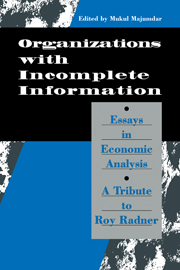Book contents
- Frontmatter
- Contents
- List of Contributors
- Preface
- Introduction: Searching for Paradigms
- 1 Equilibrium with Incomplete Markets in a Sequence Economy
- 2 The Existence of Rational Expectations Equilibrium: A Retrospective
- 3 Rational Expectations and Rational Learning
- 4 Dynamic Games in Organization Theory
- 5 The Equilibrium Existence Problem in General Markovian Games
- 6 A Practical Person's Guide to Mechanism Selection: Some Lessons from Experimental Economics
- 7 Organizations with an Endogenous Number of Information Processing Agents
- 8 A Modular Network Model of Bounded Rationality
- Index
1 - Equilibrium with Incomplete Markets in a Sequence Economy
Published online by Cambridge University Press: 09 October 2009
- Frontmatter
- Contents
- List of Contributors
- Preface
- Introduction: Searching for Paradigms
- 1 Equilibrium with Incomplete Markets in a Sequence Economy
- 2 The Existence of Rational Expectations Equilibrium: A Retrospective
- 3 Rational Expectations and Rational Learning
- 4 Dynamic Games in Organization Theory
- 5 The Equilibrium Existence Problem in General Markovian Games
- 6 A Practical Person's Guide to Mechanism Selection: Some Lessons from Experimental Economics
- 7 Organizations with an Endogenous Number of Information Processing Agents
- 8 A Modular Network Model of Bounded Rationality
- Index
Summary
Introduction
In the now classical extension of the general competitive model to include time and uncertainty, it was observed that if at time 0 (today) there are markets for future delivery of all goods contingent on the date and state of nature, then the resulting equilibrium allocation will be Pareto efficient. Moreover, in such an equilibrium future spot markets would not need to be active; the future would simply consist of agents fulfilling their promises (see Debreu 1959). In the event that there is not a complete system of contingent commodity contracts at time 0, then a new problem arises; there will be reason for future spot markets to be active, so that agents making decisions at the current data need to make expectations about what future prices will be. Thus a new equilibrium concept is required, and that is the topic of this essay. Following the basic paper of Arrow (1964), Roy Radner, in a fundamental series of papers (1967, 1968, 1972), developed the concept of an equilibrium of plans, prices, and price expectations for the sequence of markets that will arise when there is not a complete set of contingent contracts at time 0 – a concept that has led to a substantial amount of research in the last two decades. It is the purpose of this essay in honor of Roy Radner to review this research program that his pioneering work has spawned, and to assess its future. A substantial number of interesting issues arise if all uncertainty is not resolved at the initial date.
Information
- Type
- Chapter
- Information
- Organization with Incomplete InformationEssays in Economic Analysis: A Tribute to Roy Radner, pp. 20 - 41Publisher: Cambridge University PressPrint publication year: 1998
Accessibility standard: Unknown
Why this information is here
This section outlines the accessibility features of this content - including support for screen readers, full keyboard navigation and high-contrast display options. This may not be relevant for you.Accessibility Information
- 1
- Cited by
